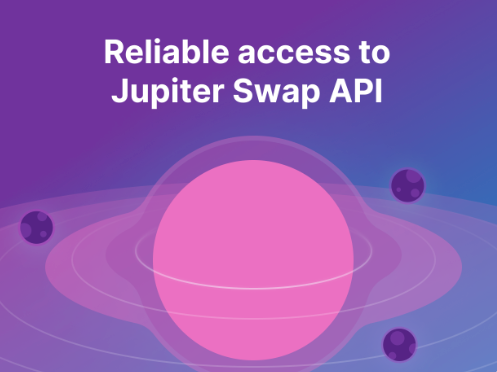Jupiter Airdrop Guide: All You Need to Know About the JUP Airdrop on Solana
Comprehensive guide to the Jupiter ($JUP) airdrop on Solana: Explore eligibility, dates, and how to prepare for the airdrop.

The story of Solana is all about resilience. Following the FTX collapse, the network faced lows in volume and price, but the recovery has been no less of a fairytale. In the past 24 hours, Solana DeFi processed transactions worth more than $700 million.
In context, on 1 October 2023, Solana's DeFi volume stood at just $48 million, meaning almost 20x in volume within four months.
A significant reason behind this bump in Solana interest is Jupiter, a DEX aggregator that has accumulated nearly $70 billion in trading volume.
Jupiter is set to launch their official token, $JUP, with a highly anticipated airdrop, touching nearly a million eligible wallets.
What is Jupiter?
Jupiter is a decentralized exchange (DEX) aggregator on Solana that facilitates token swaps with low slippage and minimal fees, offering features like swap, limit orders, perpetual trading, and DCA — dollar-cost-averaging. Earlier today, Jupiter briefly became the largest DEX by trading volume, overtaking Uniswap.
Several Solana projects and protocols are working with Jupiter to offer a simple yet effective DEX experience. This ranges from popular wallets like Phantom to liquid staking protocols like Marinade, and not to forget, Jupiter supports nearly 27 DEXs on Solana.
The current 24-hour trading volume on Jupiter is over $500 million. The colossal activity bump is due to the upcoming airdrop of Jupiter's official token — $JUP.
What is $JUP?
At Solana's Breakpoint conference in 2023, Jupiter revealed plans for an airdrop of its JUP token, its official governance token. 40% of the total $JUP supply is designated for this airdrop spread across four rounds. The first round, set for Wednesday, January 31st, will benefit nearly 1 million of its early users.
$JUP utilities
Currently, the $JUP token is supposed to be the official governance token. $JUP token holders will get to vote and participate in Jupiter's decision-making and other ecosystem initiatives like Jupiter Start.
Moving forward, we can expect more utilities to be attached to the $JUP token, like liquidity pools or liquid staking. Since $JUP supports multiple protocols on Solana, it also might be an ideal collateral for lending protocols.
Jupiter Airdrop: Important Metrics to Know
Date: Wednesday, January 31st
Total JUP tokens: 10 billion JUP tokens
Airdrop allocation: 4 billion JUP tokens (40% of total supply)
Distribution mechanism: Four airdrop rounds
The first round consists of 10%, i.e., 1 billion JUP tokens
Eligibility: Wallets that interacted with Jupiter before November 2nd, 2023.
Note: This wallet count is estimated to be 955,000 wallets
Airdrop breakdown for the first round
- Even distribution for all eligible wallets accounts for 2% of the total airdrop.
- Tiered score-based distribution based on adjusted volume accounts for 7%.
- Allocations for active community members on Discord and Twitter and developers make up 1%.
The magnitude of this event is underscored by Jupiter's user base, involving over 955k unique wallets. This level of user interest highlights Jupiter's significant role in the market and the trust and reliability it has cultivated among its users.
WEN Airdrop: Jupiter's Test Before $JUP Airdrop
Like the above, Jupiter DEX launched a new coin, $WEN, on January 26 to battle-test Jupiter and Solana. $WEN comes with a total supply of one trillion, and 70% of it is equitably distributed across over a million wallets, including Jupiter platform users and various NFT holders.
The $WEN launch was designed to test Solana's load-handling capacity, liveness, and bot spam. To specifically counter bot spam, the Jupiter team employed strategies like throttling max tokens per swap, designing a steep price curve, and enabling retail users alike to execute bot-like strategies.
Meow, the anonymous founder of Jupiter, released a post-launch analysis of the $WEN airdrop. To put it briefly, Meow mentioned that the WEN launch was a valuable learning experience before the $JUP launch. It exposed gaps in bot mitigation and operational practices.
And Meow confirmed that the team plans to address these issues for future launches.
How do you best prepare for the upcoming $JUP Airdrop?
Before the JUP launch, preparing to ensure a hassle-free claiming process is wise. If you're a regular user, remember to go through all your wallets and claim your tokens as soon as they're available.
For those planning to engage in heavy trading or use a trading bot, consider exploring the QuickNode Jup API add-on.
Make lightning-fast calls to Jupiter swap API via their SDK with clear and reliable rate limits. Never worry about setting up or maintaining a server with our rolling restarts and elite-level latency.
Get started here in the QuickNode Marketplace.

Here is a simple three-step process on how you can claim the airdrop using QuickNode's custom RPC (Based on the $WEN airdrop):
Step 1: Go to Jupiter and hit "Yes, me, brave cat."
Step 2: Hit "connect wallet" and connect your Phantom or a wallet of your choice.
Step 3: Click the 'settings' icon on the top and add your free QuickNode's custom RPC link. Click save, and you're on your way!
FAQ: Why QuickNode for Solana and $JUP Airdrop?
Public endpoints, while readily accessible, often suffer from instability and unpredictable performance. This can lead to increased downtimes, slower transaction speeds, and unreliable service. In contrast, QuickNode's free endpoints offer a robust alternative. They are engineered to provide exceptional security and reliability, mitigating the risks associated with public endpoints.
Research of Solana node providers saw QuickNode going up against competing service providers like Alchemy, Infura, Chainstack, and four more.
The research tested latency, response times, and data reliability spread across regions and over vibrant sampling data.
QuickNode had the fastest global average response time at 104 ms, almost 3.5x faster than the next provider.
About QuickNode
QuickNode is building infrastructure to support the future of Web3. Since 2017, we have worked with hundreds of developers and companies, helping scale dApps and providing high-performance access to 26+ blockchains. Subscribe to our newsletter for more content like this, and stay in the loop with what's happening in Web3!





